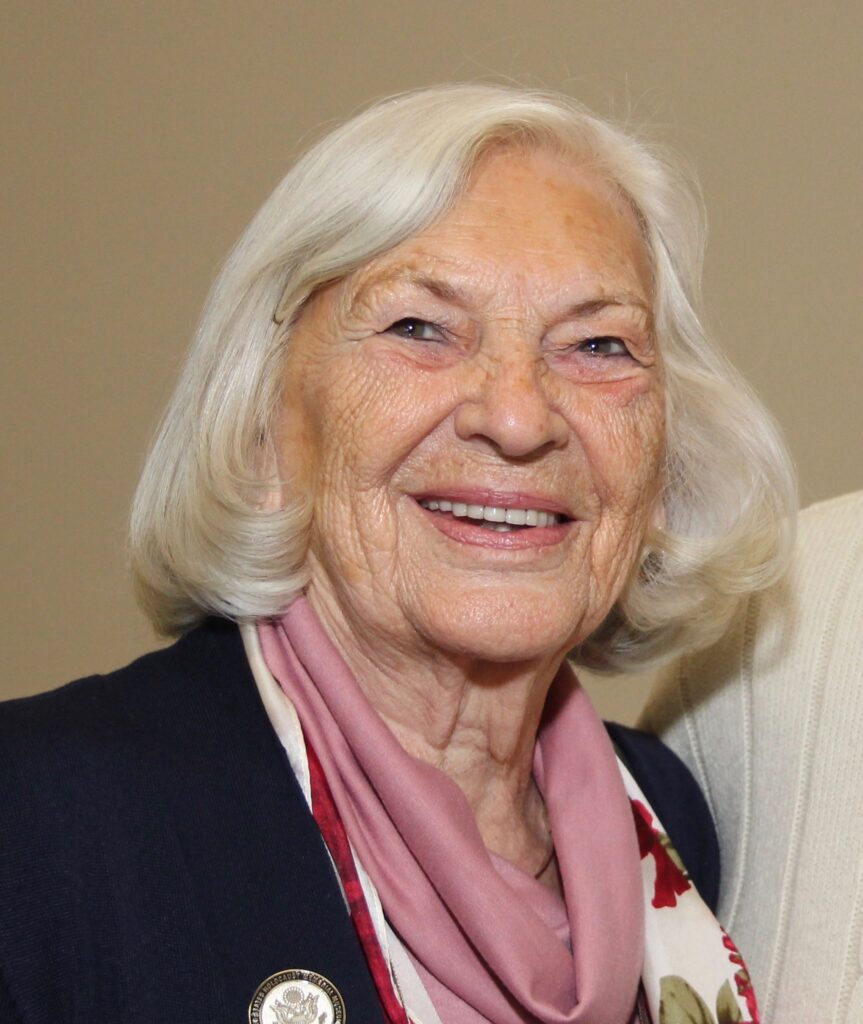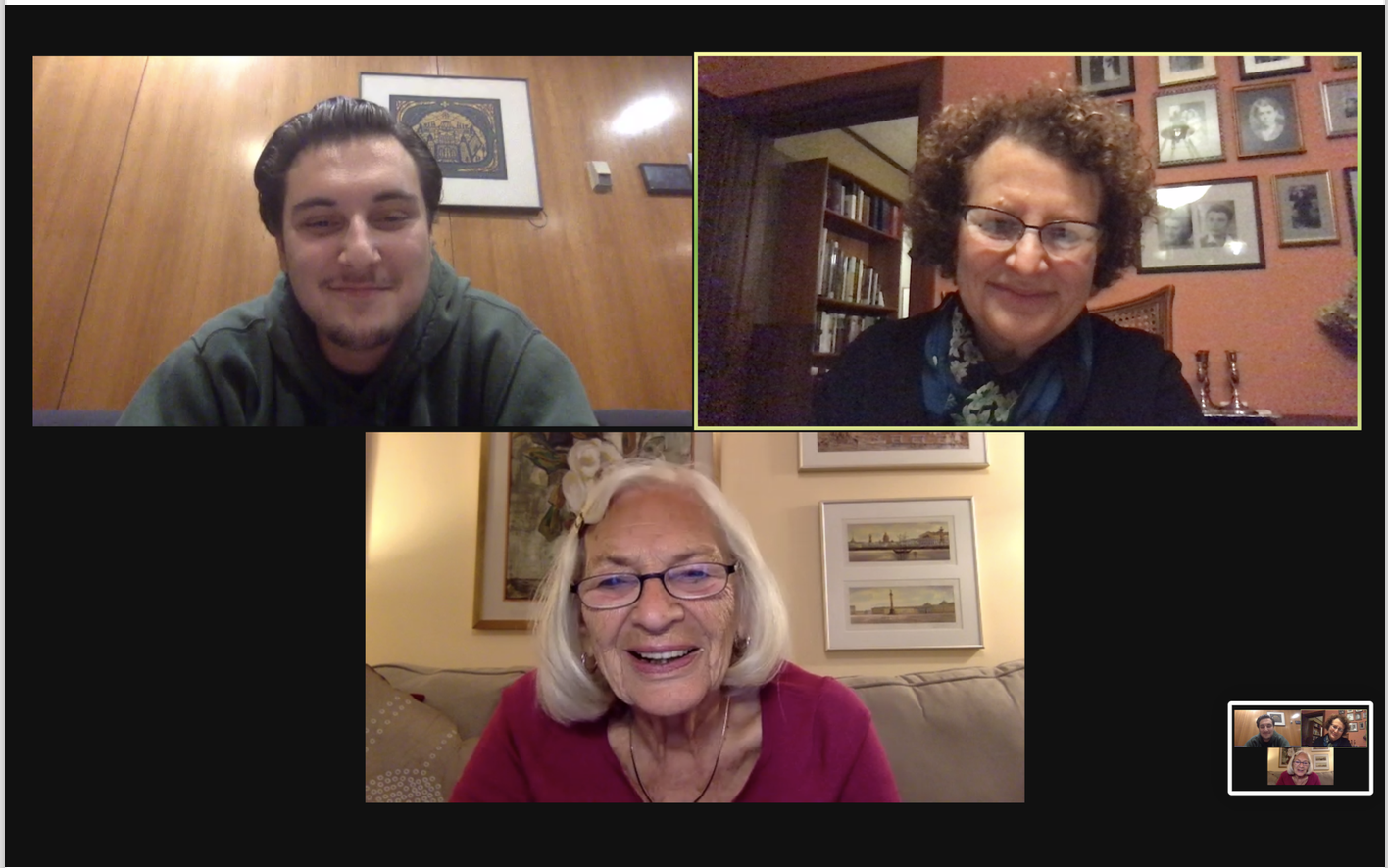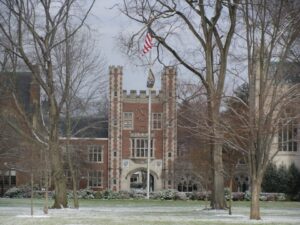Brendan W. Clark ’21
“There is nothing cleansing about the Holocaust,” Ruth Weiner, a survivor, told members of the Trinity community last Thursday evening with a sense of stern, but thoughtful composure. “I object strongly to the suggestion that what occurred was an ‘extermination’ or an ‘ethnic cleansing.’”
Weiner’s words held great resonance as she reflected on life as a young Jewish girl in Vienna in the 1930s, existing in the shadow of the Nazi atrocities that would soon follow. Weiner addressed the daily realities of Jewish persecution and mistreatment at the hands of the Nazis, and spoke especially of her remembrances of Kristallnacht—the “Night of Broken Glass”—from November 9-November 10, 1938. The 82nd anniversary of Kristallnacht, when the Nazi’s vandalized, burgled, burned, and desecrated Jewish businesses, homes, and places of worship, passed just last week.
Brought to speak at Trinity with the assistance of Harrison Silver ’22 and Trinity Hillel, Weiner asked a simple question of the audience of several dozen students and alums: “why should anyone be interested in something horrible that happened 82 years ago?” Through her hour and a half presentation, that question was doubtless answered. The importance and value of her story was clear in affording an understanding that the Holocaust was not a disparate event, far from our daily realities, but profoundly impactful and devastatingly tragic for individuals, for families, for each and every man, woman, and child touched by the murder of the more than six million Jews throughout World War II.
Weiner continued: “students of history tend to view things writ large, and what we are going to talk about today is one family.” To get a sense of that six million, Weiner asked that we consider every man, woman, and child in Connecticut, Rhode Island, Vermont, New Hampshire, and Maine,” and “you are still going to need a few from Massachusetts.” Those lives, “every single one of them: eliminated.” If the gravity of that figure had not dawned on the students by then, her haunting recollection of the atrocities committed by the Nazis in Vienna illuminated that reality.
Kristallnacht was not known as Kristallnacht for Weiner. It was simply remembered for many years as “November 10.” The Vienna of Weiner’s childhood was one of culture and interest, home to the Jewish community and her family—the Steins and Froshes—who were deeply embedded in the intellectual life of the city before the war. There were two groups of Jews in Vienna at this time, Weiner added: first, an “intellectual and professional class” who was well-to-do and comfortable that came to play an “important role in the academic life of the city.” Then, later on, they were joined by Jewish refugees from the Eastern Hungarian empire.

The Anschluss or annexation of Austria by the Nazis in March 1938, Weiner noted, was “an experiment on the part of Hitler,” a preliminary assessment of sorts of how the Holocaust and the coming invasion of Europe might play out. Before their arrival, Weiner saw much of Vienna. As she put it: “when you have many doting uncles and aunts, you are going to live a very enriched life.” Weiner spoke of her and her family’s heritage in the city and growing up in the neighborhood and parks where her grandparents and great grandparents had lived. Generations in the city of Vienna…an intimate part of its culture and history.
With the Nazi occupation, that daily life changed. Weiner recalled witnessing Jews forced to scrape paper off the cobblestones of streets with their fingernails, until they bled, and belittled by others standing by. “When you walked through the streets at a very young age, you learned to make yourself invisible,” she added.
“I first realized I was different,” Weiner remarked, when she was confronted by a former friend at her school. A fellow student, Kitty, had been injured and had a cast. Weiner was charged with taking care of her, helping her with her books and lunch, and the two became close. One morning, however, Weiner was told that she could no longer attend class and, when Kitty saw her, she spit in her face because she was Jewish. “Her father must have been a member of the Party” and, with that, the friendship was ended.
On the night of November 10—Kristallnacht, Weiner recalled hiding in the living room without making a sound as the Gestapo pounded on the door for many hours, while Jewish stores, homes, and synagogues were vandalized, robbed, and burned. As the night wore on, Weiner, holding a flashlight, read a children’s book cover to cover—Es War Einmal—meaning “Once Upon A Time.” And as she read and the night turned to morning, the “banging and pounding was further and further apart, and a brave, non-Jewish friend came to rescue her and her mother from certain arrest.”
Asked how she was aware and could understand these events at such a young age, Weiner remarked that “any Holocaust survivor will tell you that their childhood flew out of the window the day the Nazis marched in.” You were an adult thereafter, forever changed by the calamity of the Holocaust and the barbarism of the Holocaust. Weiner would escape to England via the Kindertransport—a refugee network for children—and would later be reunited with her parents, Emil and Edith Frosh.
At one moment, Weiner held up a headline that appeared in The New York Times on November 11, 1938. It read “Nazis Smash, Loot and Burn Jewish Shops and Temples Until Goebbels Calls Halt.” “You know what happened after that? Nothing. The horrors went on and on,” Weiner concluded. She reminded us, too, that the “only thing worse than talking about tragic events is not talking about them.” For those from Trinity in attendance, the impact of her words will not soon be forgotten. And for those who were absent, we are reminded now—more than ever—of the importance of remembering our collective past, lest we be doomed to repeat it.





+ There are no comments
Add yours